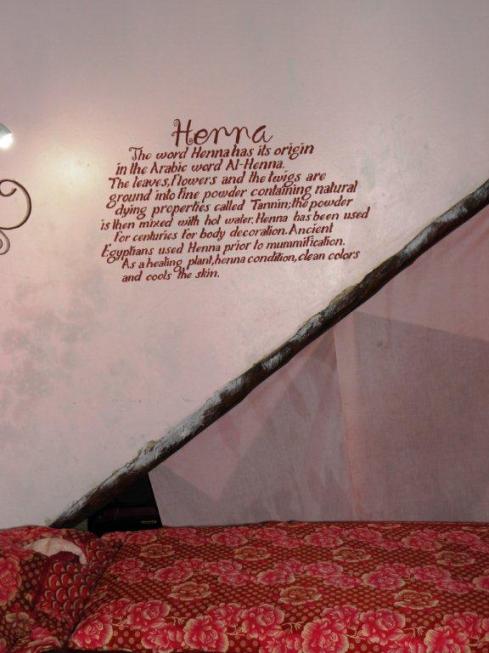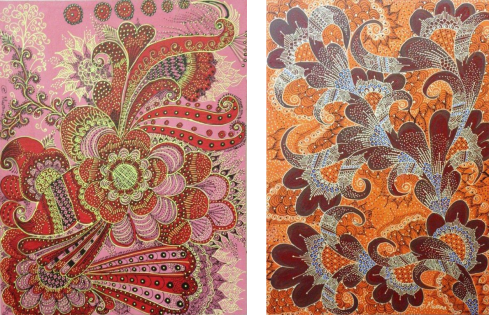Henna has been around for centuries, from as far back
as the Bronze Age across Africa, the Middle East and Asia. It’s used to
decorate the body and hair and even as a dye for silk, leather and wool.
Traditionally, henna is worn at times of celebration, for weddings and religious festivals such as Eid
.

In a Swahili wedding, the bride is decorated with henna for luck and to bless the marriage. A bride can sit for hours, as the henna artist paints patterns across her skin, flowers blooming over her arms, decorating both sides of her hands and over her feet and legs, nails stained orange with the dye.
In Zanzibar, henna patterns are a fusion of Arab and Indian designs, combining the intricate fine floral and paisley patterns found in India mehindi with larger flowers found in Arab henna.

Henna is made from the leaves a flowering shrub, which thrives in tropical gardens and can be found across Zanzibar and Tanzania.
To make the dye, branches are cut down and left to dry in the sun, until the leaves fall off. The leaves are collected, ground into a powder and sifted to remove any impurities. The powder is mixed into a paste with lemon juice and sometimes essential oils like lavender, tea tree or eucalyptus added to the mixture to strengthen the color, making the dye last longer. When the past is read, it's applied to the skin, usually piped through a cellophane cone although a toothpick can used to trace out the designs. The past is left to dry on the skin and flakes off to reveal the reddish brown patterns underneath. The dye darkens during the first couple of days and can last for up to a fortnight before fading.
Black henna, known as wanja in Swahili, has become increasingly popular in henna designs. Wanja used to be made from seeds which were burnt and then cooked with coconut oil to make a paste, similar to red henna, but nowadays, black hair dye is often substitiuted for the organic paste



And it’s not only on skins – the Swahili have merged body art and canvas
to produce permanent artwork that attests to the beauty of their henna.
The Hurumzi Gallery in Stone Town is the home of ‘henna art’ in
Zanzibar. It displays some of the most beautiful designs created by
local artists. A new spectrum of colour has revolutionised henna culture
on the islands and the designs – once doomed to fade after a week or so
– are now tattooed on canvas. Henna art is now embraced – alongside the
more iconic and mainland tinga tinga painting, and pieces are joining
private collections of African art


Medicinal Usage
Apart from its traditional and ceremonial uses, henna is known for
its medicinal properties of healing and relaxation. It is used to heal
skin diseases, cure headaches and cool the skin
to reduce swelling in hot seasons. Mehndi oil is used by therapists to treat a number of ailments, such as scalp treament for hair fall, hair growth and nail conditioning.
to reduce swelling in hot seasons. Mehndi oil is used by therapists to treat a number of ailments, such as scalp treament for hair fall, hair growth and nail conditioning.
- Soak mehndi leaves in water all night and drink the decanted water in the morning for 40 days—this is an effective remedy for jaundice, leprosy and healing wounds.
- Gargle with mehndi water for relief from stomatitis and ulcers of tongue, cheeks and lips.
- Henna paste is applied on the soles of patients suffering from small pox and chicken pox, as it is believed that this prevents the eyes from damage associated with these diseases.
- Henna paste mixed with vinegar is applied to nails that get disfigured after fungal infection.
- Mehndi also acts as a blood purifier.
- Headaches caused by heat strokes can be treated by smelling henna flowers.
- Olive oil mixed with mehndi leaves is very effective for easing muscular pains and rigidity.
- As mentioned earlier, henna has always been used to cool the body, particularly feet.










Blogger Comment
Facebook Comment